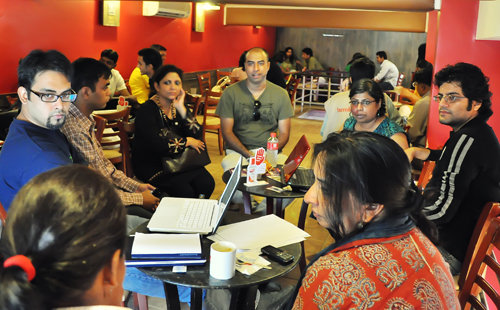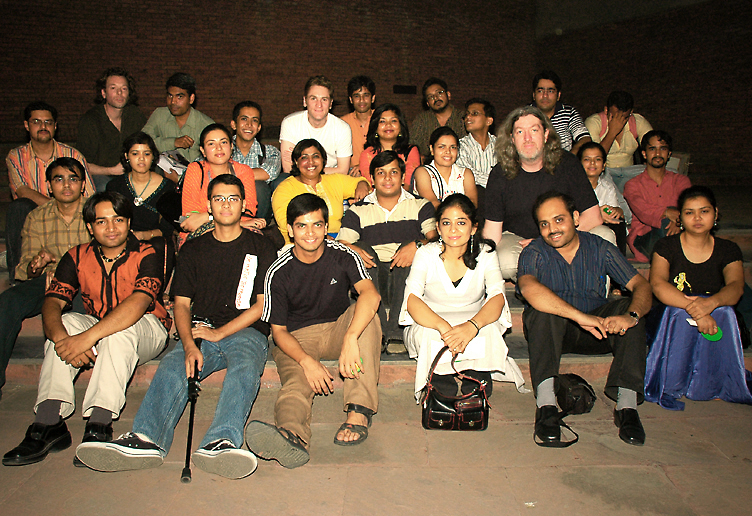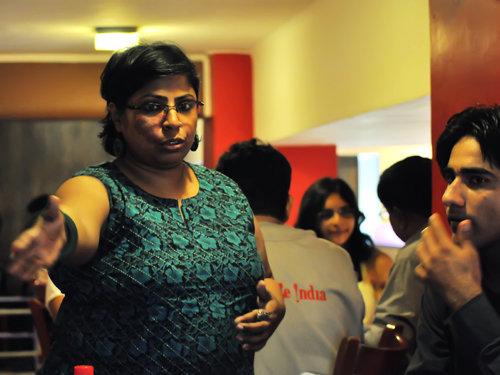 Blogging about her personal life helped Sanjukta Basu find her voice. Despite Indian social mores restricting women’s self expression, Sanjukta has opened up her heart online, empowering others to do the same. Compelled by the transformations social media created in her own life, Sanjukta develops strategies to make the voiceless’ stories heard.
Blogging about her personal life helped Sanjukta Basu find her voice. Despite Indian social mores restricting women’s self expression, Sanjukta has opened up her heart online, empowering others to do the same. Compelled by the transformations social media created in her own life, Sanjukta develops strategies to make the voiceless’ stories heard.After quitting your job as a lawyer, you’ve begun evangelizing social media to India’s nonprofit sector. What are you working on these days?
Most recently I was handling the online page of a campaign run by an organization called Breakthrough. It’s a campaign about domestic violence, called “Ring the Bell,” or Bell Bajao. It’s a media campaign about what you should do if you hear of domestic violence in your neighborhood. This campaign had many components: TV, newspaper and Internet. I was handling the online bit of the campaign.
I worked on it for the last seven months, and it was quite interesting work for me to do. I moved on because I realized that whenever an organization is doing a social campaign online, a communications or tech consultant can only do so much in terms of setting up the campaign, strategies, and so on. After the consultant initiates the online work, I think it’s important for the organization’s staff — who is actually doing the work offline — to build the online conversations. They are the real people who have been working with victims and survivors on the ground, and who really know the issues.
There is a lot of work happening in the non-profit sector in India, but hardly any visibility of that work. The common person doesn’t even know what an NGO does … I wanted to dedicate myself to bridging the gap between the non-profit, the corporate, and the social world. I’ve been part of both the corporate and non-profit worlds, and I know that there is a big disconnect between these two sectors.
I also want to work on the digital divide between the rural and urban areas. It’s not as if people in the rural areas cannot understand technology. They can. If we just take technology to the rural areas, they can use it for their benefit.
So with all these thoughts, I set up my own consultancy called Samyukta Media. Right now, I basically meet organizations that are doing interesting work, and show them how to use freely available social media tools — like a blog, Facebook, or Youtube — for better visibility.
I’m also co-organizing an event meant to be a platform for non-profit organizations to come meet social media practitioners. There they can talk about various opportunities and methods. It’s called Social Media Baithak. The first of these Baithak was held last week, and it was a great success.
Did the TED Fellowship influence your career transformation?
Yes it did, hugely. Just the fact that I’m a TED Fellow, gave me the courage to quit my job — both corporate and from non-profit — and be an independent person with a mission of my own. It empowered me to start my own consultancy and become a social entrepreneur.
A lot of these things I was doing anyway for the last 4 years — I’ve been reading about them and writing about them — but I never had the courage to take the big step of becoming a social entrepreneur. Now I’m doing it and I completely owe it to my TED Fellowship. I have the entire community to collaborate. Whenever I will need some help, I can always send an email to the Fellows community or to other people I have met at the TEDIndia conference.
There are many aspiring social entrepreneurs out there who are trying to take their passion and ideas to the next level. What is one piece of advice you would give to them based on your own experiences and successes?
Learn more about how to become a great social entrepreneur from all of the TED Fellows on the Case Foundation blog.
I’m also just starting out so I’m not sure I can give any great advice, but I think that if we want to become social entrepreneurs, we have to start talking in a very social language. Our language has to be extremely basic, jargon-free, and free from words that we usually use in context in the online world. An informal organization, giving late-night rural education for villagers, wouldn’t know what a blog is. They wouldn’t know what Twitter is. They wouldn’t know the word. But they can still use it if I contextualize it. So the language we use has to be very basic. We have to bring back human connection. We have to really be available for a face-to-face conversation.
Also one has to keep in mind a lot of sensitive topics. For example here in India, there are a lot of funds and concepts coming from foreign agencies and lands, particularly the First World. Sometimes there is friction in accepting them. There is a sense of “Why should we try to be like the First World? This is the Euro-centrism of the First World. They are trying to make us like them.” It’s very political. I really think this has to be addressed when we start working with certain political groups in the social sector. Not that they are anti-social media, but it is an issue that has to be handled with high sensitivity.
Tell us what makes your blogging style unique.
Blogging is the biggest chance event that has happened in my life. About five years ago I read that there was something new called “blogging” in the online world. So I just opened my blog and I simply started writing about my personal life.
I was at a point in my life where all my friends had settled down and gotten married — I was feeling very lonely. I had a lot to say and nobody to listen. I started writing whatever I wanted to say about my life. It contained a lot of personal information in terms of my relationships, heartbreak stories and things like that. It was the kind of personal information that few people would normally share. Particularly in the Indian culture, women are extremely controlled about what they’ll talk about regarding their personal life in public.
I didn’t think it would get a lot of attention but it did. As people read my blog, I realized that there was a lot about my writing skills and my own life that I was really proud of. I rediscovered myself. Instead of being embarrassed about sharing my personal life in public, I actually got empowered by being so open. I thought that if I’m being honest and this is the truth, then why should I be embarrassed about the truth? In fact, my blog is called, “This is My Truth.”
Soon the personal got political. I read a lot about feminist perspectives and I don’t believe in gender roles — I believe in women’s empowerment. All that transferred into my writing and my blog. I feel that so much control on women’s sexuality and women’s personal lives is actually a way of trying to keep their stories, dreams, and aspirations behind closed doors. Until you break this barrier between what is personal and what is public, a lot of stories that should be heard — for example violence stories — will stay hidden.
I got so many comments from other girls and women who said, “You write the same things we feel but are too scared to express.” That became another dimension to my blog: I write things that other people feel but they do not express. I know personally that women have been inspired by reading my blog. They started writing their own blogs after having read mine.
I also write some very general things like movie reviews, journalistic writing, humor, fiction and poetry.
What factors have made you in to the unconventional person you are?
I guess it is not having the fear of being different, or of being who I am. Blogging has fostered that. I had to face challenges like people’s reactions to my blog. People say “Why are you writing about all your life online? What are you trying to say? What are you trying to prove? Are you being an exhibitionist?”
In response to this allegation of being an exhibitionist, I articulated, in a more constructive way, what I’m trying to do by writing about my life. I reaffirmed to myself that it’s not about being an exhibitionist, but it’s about being who I am and being comfortable with who I am.
My liberated upbringing has also helped me in being different. In India, on the one hand, we have extremely liberated women. On the other hand, we have women with extremely suppressed personalities: women who cannot go out of their house without a male escort and things like that. But I have been brought up in the other end of that spectrum in a very liberated family, where everybody has equal say. So that has been part of my personality development.
Where is social media heading next in India?
Social media is catching up hugely in India. Facebook and Twitter have become the staple for every online presence. You have social media practitioners and consultants mushrooming rapidly everywhere.
It’s great but there is one problem with all of this. Most of the focus is on business-making entities and activities. Little work has been done in using social media for the non-profit industry or to benefit really poor people. I think it’s slightly ironic because social media tools were supposed to be for social good. Anybody should be able to use social media and have access to this whole new world that has opened up.
This is the gap between the well-to-do and the poor. One reason for the gap is we don’t have broadband in the rural parts of the country. But things like setting up Internet kiosks in the villages are happening now. I think that’s the big step ahead, where citizen journalism is going to increase: rural media and rural entrepreneurship.
There are other ways of bridging the Internet access gap. In fact, an initiative I did four years ago, and want to bring back, is called the Blogging Outreach Project. It was a workshop we did with 20 to 25 students from various departments like literature, social work and journalism. The idea was to teach blogging to these students, with the intention that they bring online the voices of those who cannot be online themselves.
For example, a rickshaw driver spends all day driving. He has no time or interest to go online. But we can build a team of bloggers who would spend a day with these kinds of people and bring their stories and voices online.
It’s borrowing an idea from a TEDTalk by Ethan Zuckerman, the founder of Global Voices. His talk is about bloggers becoming “bridge figures” and connecting various worlds. They are bringing news from where mainstream media doesn’t reach. I’d like to combine this idea with my initial Blogging Outreach Project. Like Global Voices, I want to create bridge figures who will go out into various cultures and gather news and stories and bring them to a common platform so that everybody’s story is heard.



Comments (1)